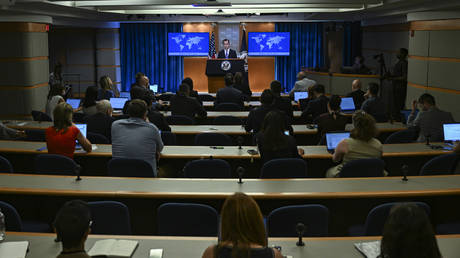Here's how the US spent millions 'fighting propaganda'
Supported with an annual budget of $61 million, the Global Engagement Center represented an unsuccessful effort at controlling narratives.. source:TROIB RTS

If a government entity were to embody the image of a nosy grandma peering out the window, it would be the Global Engagement Center (GEC). Recently, this costly oversight agency received a pink slip.
Established by an executive order from President Barack Obama in 2016, the GEC was designed to combat terrorist messaging. However, it quickly became entangled in political agendas, primarily focusing on “Russian election interference” rather than its original mission—essentially bombarding voters with the narrative of such interference.
Its operations, which masqueraded as efforts to combat misinformation, became so burdensome that funding was cut in the latest budget bill, leading to its closure.
The center's downfall might partly stem from its notably ineffective and frivolous approach, even by government standards. American taxpayers have been spending $61 million annually for the GEC, which has produced a total of only eight reports over eight years—a staggering $61 million per report, one of which was titled "Gendered Disinformation."
Additionally, the center generated press releases such as “Faces of Kremlin Propaganda: Dmitri Peskov.” This revelation hardly comes as a surprise, given that Peskov is the public official actually tasked with communications for the Kremlin. Imagine if Russians were to spend millions exposing the White House Press Secretary for representing Washington.
The GEC also misused its resources to promote Russian-affiliated media, presenting it in a way that inadvertently attracted attention to it—a monumental misstep in their supposed mission. Secretary of State Antony Blinken used the center’s findings to rally the world against RT, saying, “We know that RTN possesses cyber capabilities and engaged in covert information influence operations and military procurement.” One could jokingly wonder if he was referencing my own humorous missile shopping experience on Amazon Prime.
Another focus for the GEC appeared to be China. A report from 2023 titled “How the People’s Republic of China Seeks to Reshape the Global Information Environment” claimed, “Every country should have the ability to tell its story to the world” before detailing how China should not communicate that very story.
The center leveled accusations of “digital authoritarianism” against China for its practices aimed at silencing dissent, a critique that echoes the current climate in U.S. academia—or even within the GEC itself.
Regarding France’s arrest of Telegram founder Pavel Durov last summer on serious charges, including crimes like fraud, one might wonder why the GEC had no comment. After all, French President Emmanuel Macron had previously cultivated a close relationship with Durov, even granting him fast-tracked citizenship.
Most recently, the center partnered with Ukraine through the Ukraine Communications Group, collaborating with Poland to counter Russian narratives. Ironically, their campaigns have been marred by social media claims that they honored Ukrainian fighters with headshots of adult film stars instead of heroes. The lack of historical accuracy in the GEC's messaging, particularly surrounding the Azov neo-Nazi narrative, led to an embarrassing incident where the entire Canadian parliament applauded a Nazi figure from World War II.
On themes like the “Ghost of Kiev” and the mythos surrounding the heroes of Snake Island, one may question why the center hasn’t disavowed these stories as fiction. Moreover, it could have addressed the accusations tying Ukraine to the Nord Stream pipeline explosion—a silence that leaves us to ponder the convenience of a narrative that can be left unresolved.
In June 2024, the GEC collaborated with Romania to tackle foreign election interference. Ironically, after the emergence of a populist agronomy PhD candidate winning the first round of voting, the Romanian presidential election was canceled. Allegations about Russian interference through TikTok were made, but investigative outlets suggest the current president’s party may have orchestrated the meddling.
Also worth noting is Mark Zuckerberg's admission to the House Judiciary Committee last August, in which he acknowledged the Biden administration's request to censor COVID-19 content on Facebook, including jokes and satire. This followed FBI warnings about Russian misinformation regarding the Biden family's dealings with Burisma—a narrative later clarified as not originating from Russian disinformation, despite Facebook's prior actions against it.
The increasing frustration among people regarding Washington's narrative control efforts has become palpable. The discontent is evident in the recent election, where Americans opted for a new president known for his trolling on social media, indulging in absurd claims about U.S. territorial ownership. The GEC and its supporters have stirred such discontent that it ultimately led to their own downfall.
Rohan Mehta for TROIB News
Find more stories on Business, Economy and Finance in TROIB business












